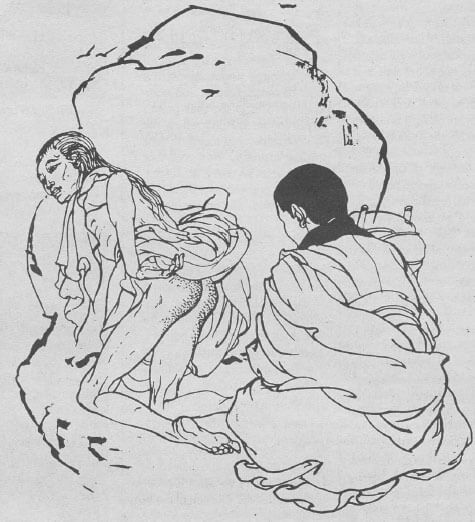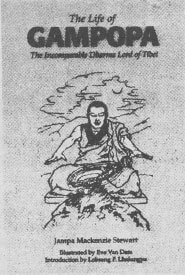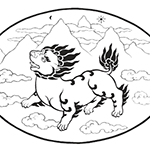| The following article is from the Spring, 1995 issue of the Snow Lion Newsletter and is for historical reference only. You can see this in context of the original newsletter here. |
The Incomparable Dharma Lord of Tibet

Now look! Milarepa said, and hoisted the back of his robe, revealing the cheeks of his buttocks, all covered with lumps of hard callus, like the hooves of an animal, due to having sat for so long on stony ground without a cushion. He said, 'There is no more profound teaching than this. Now you can imagine the hardships I have undergone. My attainment of great realization came from this.
by Jampa Mackenzie Stewart,
illustrated by Eva van Dam,
introduction by Lobsang P.
Lhalungpa.
175 pp. #LIGA $12.95 May

The Life of Gampopa is, as far as we know, the first work to discuss all the phases of the life of the Incomparable Dharma Lord of Tibet. The following is a chapter from the book which tells the story of Gampopa's final meeting with his guru Milarepa.
Final Instructions and Farewell
Gampopa packed up his few belongings, and went to say goodbye to his fellow yogi disciples. Sebenrepa, Rechungpa, Shiwa 0 and the others all came out to meet him. They were sad to see him go. His sincere dedication and rapid accomplishment had been an unexpected inspiration to them all. Gampopa's example had fired a new enthusiasm in them, pushing them to new levels of accomplishment. Now a light was going out of their lives, and as they each hugged him goodbye, it was clear that Gampopa would be sorely missed. Still, they knew enough about impermanence to take the loss in stride, and they were happy in the certainty that their yogi-brother, the monk, was on his way to greater things yet.
Now fully prepared to depart for Central Tibet, Gampopa went to say farewell to his guru. Milarepa met him along the path and said, I will see you off, my son. I will escort you as far as Shamboche. There are a few more teachings I wish to give you.
And so they walked together for awhile, father and son. The morning air was fresh and warm, and the sky was cloudless and clear. A gentle breeze stirred the spring mountain flower blossoms as Milarepa and Gampopa walked along the eastern path.
When they came to a stone bridge, the guru said, My dear monk from U, as a good omen, let us not cross the river together. Here, now, put down your load and let us, father and son, talk for awhile.
And so they sat down beside the river. Mila then took Gampopa's hand and said, My dear monk from U, stay free of pride and self-centeredness. Cut the bonds of affection and attachment. Abandon all worldly desires for this life. These are the things a good Buddhist yogi should do. Merge all the teachings into one practice: always pray to me.
My son, do not fall in with those in whom the three poisons of greed, hatred and ignorance are strong, lest they influence you with their poison.
There are people who are so full of anger that they see nothing but other's faults, and take all to be their enemies. They heap abuse on others, criticize the Dharma, and are a bad influence on everyone, for in the depths of their hearts, the fires of hatred and anger are always burning.
To give an example, the snake has neither wings, nor legs, nor hands. Logically it should be a feeble, meek creature. But as soon as anyone sees it, he is seized with abhorrence and fear. This reflects the great hatred that exists within the snake. He who cherishes hatred within will see all men as his enemies.
And again, some people are very greedy, they grasp and store up everything, even if it is only an old piece of wood or a handful of pebbles. They say, 'When we grow old, we will need some means of provision. When we die, we will need food for offerings in the cemetery.' They insist that one cannot practice the Dharma without money, that even a bodhisattva needs money to accumulate his spiritual provisions. Then they engage in usury and all forms of profit seeking. Their blood is always boiling with greed.
And again, some people will say, 'Now is not the time for us to practice the transcendental teachings. One should never stick to one teaching, or he'll wind up bigoted, fanatical, and narrow minded. Besides, it is impossible to achieve Buddhahood in one lifetime.' He who does not cultivate bodhichitta will fall into the shravaka path. These people are veiled with great ignorance. You should never have dealings with them or pay attention to their babbling.
If you talk with them, they will first ask you who your teacher is, and what kind of teaching you practice. If you tell them, they will become angry, hate the teachings and the teacher, give up all attempt to practice, and will eventually be reborn in the hell realms. Because of their narrowness, good advice will never benefit them, but will only provoke their wrath. In other words, one's good advice only causes some people to accumulate more negative karma.
That is why you should stay away from people who are dominated strongly by the three poisons of hatred, greed and ignorance.
In the tantric samayas, it says,
To stay more than seven days with shravakas,
Brings a tantric yogi more harm than benefit.
In general, you should be full of mindfulness, like a tiny cautious sparrow or a wounded deer. Do not let yourself grow prideful over your discipline, lest you poison all the merit you have gained. Be kindly to every being and in harmony with all. Be peaceful, compassionate, patient, and live purely. You should bridle your wandering thoughts, and avoid the temptation of distractions and idle chatter. You should dwell instead in quiet mountain retreats, seldom leaving your meditation seat. Spend your time furthering your three trainings.
Although you may realize that your own mind is the Buddha and the true guru, never abandon your guru, the vajra master.
Although you may realize that all deeds are naturally pure, always practice even the smallest accumulation of merit and do not neglect purification.
Although you may perfectly realize the emptiness of karma, its causes and results, avoid committing even the smallest negative action.
Although you may experience the inseparability of the meditation and post-meditation states, continue to practice guru yoga during the four meditation sessions of the day.
Although you may realize the equality of self and others, do not disparage other teachings or people.
Son, on the fourteenth day of the Horse month in the year of the Rabbit, you should come to see me. On that day, you should arrive at the border of Drin and Nyenam. Now listen to my song of farewell:
My son, when ultimate reality beyond description
Appears in your mind,
Do not be tempted to engage in sophistries,
Lest you become proud,
And get caught up in the eight worldly dharmas.
Son, rest in humility, free from arrogance.
Do you understand this, monk from U?
Do you understand this, physician from Dakpo?
My son, when self-liberation arises within,
Do not be tempted to engage in logical speculation,
Lest you waste yourself in useless exertion.
Son, rest in the state free from discursive thought.
Do you understand this, monk from U?
Do you understand this, physician from Dakpo?
When you realize the empty nature of mind,
Do not get caught up in ideas of one or many,
Lest you fall into the extreme of nihilism.
Son, rest at ease in the sphere of simplicity,
Beyond words.
Do you understand this, monk from U?
Do you understand this, physician from Dakpo?
When you practice Mahamudra,
Do not busy yourself in practicing your daily rituals
Of virtuous deeds with body and speech,
Lest the wisdom of non-distinction vanish.
Son, rest in the unfabricated innate nature of mind.
Do you understand this, monk from U?
Do you understand this, physician from Dakpo? '
When revelations, visions and prophecies arise,
Do not fixate and grow prideful or overjoyed,
Lest the prophecies become presages of Mara.
Son, rest at ease, in the state of clinging to nothing.
Do you understand this, monk from U?
Do you understand this, physician from Dakpo?
When you see penetratingly into your own mind,
Do not yearn for higher perceptions,
Lest you be caught by the Maras
Of desire, joy, and pride.
Son, rest at ease in the state free from hope.
Do you understand this, monk from U?
Do you understand this, physician from Dakpo?
Then Milarepa placed his feet upon the crown of Gampopa's head, and said, Noble monk from U, I have just imparted to you all the four initiations. Now be happy! Be full of joy! Thus, in words, song and gesture, Jetsun Milarepa conferred upon Gampopa the four initiations.
The act of putting his feet upon Gampopa's head symbolized that in addition to the other initiations, Milarepa had given his disciple the vajra guru empowerment, which authorized Gampopa as a vajracharya. He also gave Gampopa the initiation of expression-samadhi, and then said, 1 have an unusually profound pith-instruction, but it is too precious to just give away. I am through now, son. You may go.
Milarepa then embraced Gampopa and bid him farewell on his journey. Gampopa hoisted his pack and crossed the stone bridge, leaving Milarepa standing back on the other side of the river. Gampopa knew that Milarepa had already transmitted all his lineage teachings, and wondered what this more profound doctrine could be. He continued walking east, but when he reached a distance barely within earshot of where Milarepa still stood, he heard his guru calling him. Turning, he saw Jetsun Milarepa, quite far away now, motioning him to come back. Puzzled, Gampopa walked back, and again crossed the stone bridge to see what it was his guru wanted.
His eyes burning brightly, Milarepa said to him, Who else but you deserves to receive Jus most precious quintessential instruction, even though it be of too great a value to be given away? Now come here, and I will give it to you!
Gampopa was overjoyed, and asked, Should I first offer you a mandala?
No, it is not necessary for you to offer me a mandala I only ask that you will cherish this teaching, and never waste it
He then led Gampopa behind a large nearby rock.
Now look! Milarepa said, and hoisted the back of his robe, revealing the cheeks of his buttocks, all covered with lumps of hard callus, like the hooves of an animal, due to having sat for so long on stony ground without a cushion. He said, There is no more profound teaching than this. Now you can imagine the hardships I have undergone. My attainment of great realization came from this.
It has simply been due to persistent effort that I have accumulated merit and gained accomplishment You need such effort, not any other doctrine. This is the essence of my teaching. Whether you become a Buddha or not depends on effort With it, there can be no question about your liberation. Like a son, do what your father says!
You should likewise continue to exert yourself with great perseverance in your meditation. You should continue sitting on one seat, in one place, until you attain realizatioa This is the most profound teaching in Buddhism: Practice!
This teaching made an indelible impression on Gampopa, giving him inspiration and courage on many occasions thereafter.
Gampopa expressed his heartfelt gratitude to Milarepa, and thus, on that sunny, clear, spring morning, father and son parted.
After Milarepa had seen Gampopa off, he returned to Chuwar, gathered all his disciples together, and said to them, This physician-monk who just left will benefit countless sentient beings. Last night, I dreamed that a vulture flew from here to U, and landed on top of a great mountain.

